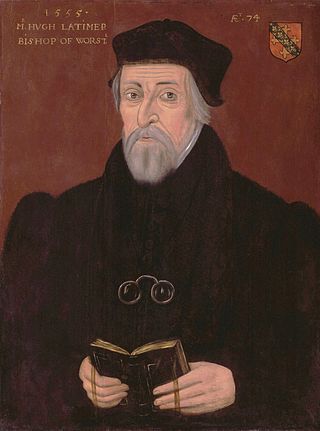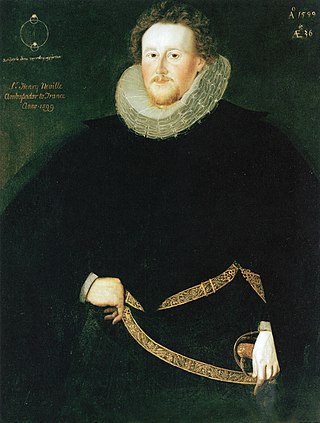Nathan Bailey, was an English philologist and lexicographer. He was the author of several dictionaries, including his Universal Etymological Dictionary, which appeared in some 30 editions between 1721 and 1802. Bailey's Dictionarium Britannicum was the primary resource mined by Samuel Johnson for his Dictionary of the English Language (1755).

Hugh Latimer was a Fellow of Clare College, Cambridge, and Bishop of Worcester during the Reformation, and later Church of England chaplain to King Edward VI. In 1555 under the Catholic Queen Mary I he was burned at the stake, becoming one of the three Oxford Martyrs of Anglicanism.
This article contains information about the literary events and publications of 1625.
Lawrence Saunders was an English Protestant martyr whose story is recorded in Foxe's Book of Martyrs.

Sir James Augustus Henry Murray, FBA was a British lexicographer and philologist. He was the primary editor of the Oxford English Dictionary (OED) from 1879 until his death.

Richard Carew was a Cornish translator and antiquary. He is best known for his county history, Survey of Cornwall (1602).

Sir William Smith was an English lexicographer. He became known for his advances in the teaching of Greek and Latin in schools.
Philip Stubbs (Stubbes) was an English pamphleteer.

Richard Chancellor was an English explorer and navigator; the first to penetrate to the White Sea and establish relations with the Tsardom of Russia.

Sir Henry Neville was an English courtier, politician and diplomat, noted for his role as ambassador to France and his unsuccessful attempts to negotiate between James I of England and the Houses of Parliament. In 2005, Neville was put forward as a candidate for the authorship of Shakespeare's works.
James Brooks was an English Catholic clergyman and Bishop of Gloucester.
John Walters (1721–1797) was a Welsh cleric from Glamorgan in the eighteenth century. He wrote a couple of manifestos, including A Dissertation on the Welsh Language (1770), in which he praised the Welsh language. He was a noted lexicographer, publishing An English–Welsh Dictionary in fifteen parts.
John Bullokar (1574–1627) was an English physician and lexicographer. He was born in St Andrew's parish, Chichester, Sussex, and baptized there on 8 November 1574, third of four known children of Elizabeth and William Bullokar.

Thomas Thynne was an English landowner of the family that is now headed by the Marquess of Bath and politician who sat in the House of Commons from 1670 to 1682. He went by the nickname "Tom of Ten Thousand" due to his great wealth. He was a friend of the Duke of Monmouth, a relationship referred to in John Dryden's satirical work Absalom and Achitophel where Thynne is described as "Issachar, his wealthy western friend".
John Harmar was an English classical scholar and Warden of Winchester College.
John Sherry, was the Anglican Archdeacon of Lewes in East Sussex, England, between 1542 and 1551.

Sir William More, of Loseley, Surrey, was the son of Sir Christopher More. The great house at Loseley Park was built for him, which is still the residence of the More Molyneux family. Of Protestant sympathies, as Sheriff and Vice-Admiral of Surrey he was actively involved in local administration of the county of Surrey and in the enforcement of the Elizabethan religious settlement, and was a member of every Parliament during the reign of Queen Elizabeth I. He was the owner of property in the Blackfriars in which the first and second Blackfriars theatres were erected. He has been described as "the perfect Elizabethan country gentleman" on account of his impeccable character and his assiduity and efficiency of service.
John Pory (1502/03–1570) was an English churchman and academic, Master of Corpus Christi College, Cambridge.
Peter Levens (1552-1587) was an English lexicographer. He was born in Yorkshire, and attended Magdalen College. He received his bachelor's and master's degrees from Oxford University.







